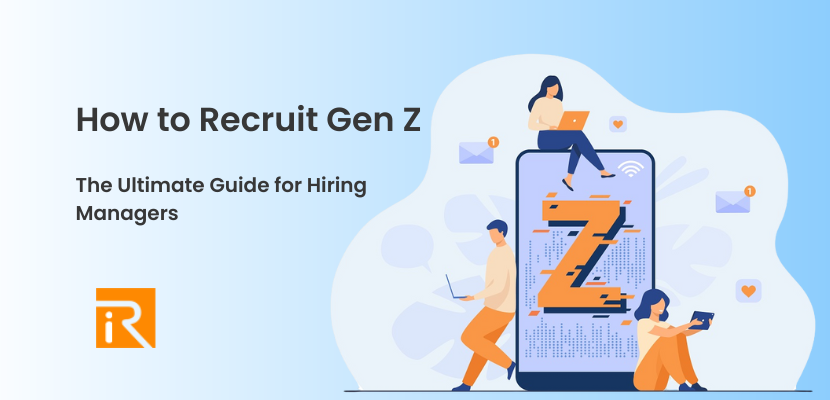
The youngest members of the workforce, Gen Z, are quickly becoming the most sought-after talent pool for companies of all sizes. With their unique perspectives and digital savviness, Gen Z are poised to transform the way we work and do business.
But recruiting Gen Z comes with its own set of challenges. Unlike previous generations, Gen Z has a distinct set of values, expectations, and communication styles. In addition, they also have different priorities when it comes to work-life balance, career growth, and company culture.
If you want to attract and retain top Gen Z talent, you need to understand what makes them tick. In this guide, we’ll walk you through the key strategies and best practices for recruiting Gen Z, from crafting your employer brand to creating a recruitment process that resonates with this unique generation.
Understanding Gen Z: Values and Expectations
To effectively recruit Gen Z, you need to understand what they value and expect from their employers. Here are some key characteristics of Gen Z that you should keep in mind:
-
Purpose-driven
Gen Z are motivated by a sense of purpose and want to work for companies that align with their values. They are more likely to choose a job that makes a positive impact on society, such as working for a social enterprise or a company that prioritizes sustainability.
-
Digital natives
Gen Z have grown up in a digital world and are comfortable with technology. Therefore, they expect companies to have a strong online presence and use the latest digital tools for communication and collaboration.
-
Work-life balance
Gen Z prioritize work-life balance and value flexible work arrangements. Therefore, they are more likely to choose a job that allows them to work from home or offers a flexible schedule.
-
Diversity and inclusion
Gen Z are more diverse and inclusive than previous generations and expect their employers to be as well. Similarly, they want to work for companies that have a strong commitment to diversity, equity, and inclusion.
Creating Your Employer Brand: Appealing to Gen Z
To attract top Gen Z talent, you need to create a strong employer brand that resonates with their values and expectations. Therefore, here are some strategies for crafting an employer brand that appeals to Gen Z:
-
Authenticity
Gen Z can sniff out inauthenticity from a mile away. They want to work for companies that are genuine and transparent in their communication and actions. Certainly, make sure your employer brand accurately reflects your company culture and values.
-
Social responsibility
As we mentioned earlier, Gen Z are purpose-driven and want to work for companies that make a positive impact on society. Highlight your company’s social responsibility initiatives, such as sustainability programs, charitable donations, or community outreach efforts.
-
Career growth opportunities
Gen Z are ambitious and want to see a clear path for career growth within their company. Be transparent about opportunities for advancement and invest in training and development programs to help your employees grow and advance.
-
Diversity and inclusion
Again, Gen Z value diversity and inclusion in the workplace. Make sure your employer brand reflects your commitment to creating a welcoming and inclusive work environment for all employees.
The Differences Between Millennials and Gen Z
While millennials and Gen Z are often grouped together as one generation, they are actually two distinct groups with different attitudes, beliefs, and behaviors.
Values and Priorities
One of the most significant differences between millennials and Gen Z is their values and priorities. Millennials grew up during a time of economic prosperity and stability, and as a result, they tend to prioritize financial security, work-life balance, and career advancement.
On the other hand, Gen Z grew up during a time of economic uncertainty, political turmoil, and social upheaval. As a result, they tend to prioritize social justice, diversity and inclusion, and work that has a positive impact on society.
Communication Preferences
Another key difference between millennials and Gen Z is their communication preferences. Millennials came of age during the rise of the internet and social media, and as a result, they tend to prefer digital communication channels like email, text messaging, and social media.
Gen Z, on the other hand, has never known a world without the internet or smartphones. As a result, they tend to prefer more visual and interactive forms of communication like video chat, instant messaging, and social media platforms like Snapchat and TikTok.
Technology Skills
While both generations are tech-savvy, there are some notable differences in their technology skills. Millennials tend to be more comfortable with traditional software applications like Microsoft Office and email, while Gen Z is more adept at using cutting-edge technology like artificial intelligence, metaverse development, virtual reality, and blockchain.
Work Style
Finally, there are differences in work style between millennials and Gen Z. Millennials tend to be more independent and self-directed, preferring to work remotely or in a flexible work environment.
Gen Z, on the other hand, tends to value collaboration and teamwork and prefers to work in a more structured and traditional work environment.
Key Recruiting Differences Between Millennials and Gen Z
Understanding the differences between millennials and Gen Z is critical when it comes to recruiting. Here are some key differences to keep in mind:
Recruiting Channels
As we mentioned earlier, millennials tend to prefer digital communication channels like email, social media, and job boards. To reach this group, it’s important to have a strong online presence and to use targeted social media advertising to attract top talent.
Gen Z, on the other hand, is more likely to be reached through visual and interactive channels like video ads, live chats, and virtual job fairs. To attract Gen Z, it’s important to use technology-driven recruitment strategies and to showcase your company’s commitment to diversity and social responsibility.
Employer Branding
Millennials tend to be more career-focused and prioritize financial security and career advancement. To attract this group, it’s important to emphasize your company’s career growth opportunities, salary and benefits packages, and work-life balance policies.
Gen Z, on the other hand, tends to prioritize social justice, diversity, and inclusion. To attract this group, it’s important to showcase your company’s commitment.
Differences in Company Culture
Another important difference between millennials and Gen Z is their approach to company culture. Millennials tend to prefer a more laid-back and casual work environment, where they have the freedom to work on their own terms and in their own style.
Gen Z, on the other hand, tends to value structure and discipline, and they prefer a more traditional work environment with clearly defined expectations and guidelines.
When recruiting millennials, it’s important to emphasize your company’s flexibility and autonomy, while for Gen Z candidates, it’s important to emphasize structure, mentorship, and opportunities for growth.
Diversity and Inclusion
As we mentioned earlier, Gen Z places a high value on diversity and inclusion in the workplace. This generation is the most diverse in history and is deeply committed to social justice and equality.
To attract Gen Z candidates, it’s important to showcase your company’s commitment to diversity and inclusion, both in terms of your hiring practices and your workplace culture. This could include initiatives like unconscious bias training, employee resource groups, and company-wide diversity and inclusion goals.
Overall, understanding the differences between millennials and Gen Z is critical for recruiters who want to attract and retain top talent. By tailoring your recruiting strategies to the unique preferences and priorities of each generation, you can build a strong employer brand and attract the best candidates for your organization.
How to Recruit Gen Z Workers
Now that we understand what motivates and drives Gen Z, let’s explore some strategies for recruiting and retaining this emerging workforce.
-
Emphasize Your Company Culture
Company culture is a key factor in attracting and retaining Gen Z talent. In fact, according to a survey by The Manifest, 60% of Gen Z job seekers consider company culture before applying for a job. Here are some ways to emphasize your company culture:
- Highlight your values: Make sure your website and job postings highlight your company’s values and commitment to social responsibility.
- Showcase your team: Use social media and other marketing channels to showcase your team and their achievements.
- Offer flexibility: Gen Z values work-life balance and is attracted to companies that offer flexible work arrangements.
- Emphasize diversity and inclusion: Highlight your commitment to diversity and inclusivity in your job postings and company messaging.
-
Leverage Social Media
Gen Z is the most digitally connected generation to date, and social media plays a key role in their job search. According to a survey, 60% of Gen Z job seekers use social media to research companies and job opportunities. Here are some ways to leverage social media in your recruitment efforts:
- Build a strong social media presence: Use social media to showcase your company culture and team, and engage with potential candidates.
- Use targeted ads: Consider using targeted ads on social media platforms like LinkedIn and Facebook to reach Gen Z job seekers.
- Encourage employee advocacy: Encourage your team to share job openings and company news on their personal social media channels.
-
Offer Unique Perks and Benefits
In addition to salary and traditional benefits, Gen Z is attracted to unique perks and benefits that align with their values and priorities. Here are some examples:
- Professional development opportunities: Gen Z values continuous learning and development opportunities.
- Volunteer time off: Offering paid time off for volunteer work can appeal to Gen Z’s social consciousness.
- Flexible work arrangements: Gen Z values work-life balance and is attracted to companies that offer flexible work arrangements.
- Sustainable practices: Gen Z cares about environmental issues and is attracted to companies that prioritize sustainability.
-
Streamline the Application Process
Gen Z is a generation of digital natives who value efficiency and convenience. As such, it’s important to streamline the application process to make it as quick and easy as possible. Here are some tips:
- Use mobile-friendly platforms: Gen Z is more likely to use mobile devices than any other generation, so make sure your application process is optimized for mobile.
- Simplify the application process: Keep your application process simple and straightforward, and minimize the number of steps and required fields.
- Offer alternative application methods: Consider offering alternative application methods, such as video applications or social media submissions.
-
Embrace Diversity and Inclusion
Gen Z is the most diverse generation to date, and they value diversity and inclusivity in the workplace. Here are some ways to embrace diversity and inclusion in your recruitment efforts:
- Use inclusive language: Use inclusive language in your job postings and company messaging to attract a diverse pool of candidates.
- Implement blind hiring practices: Consider implementing blind hiring practices to remove bias from the hiring process.
- Partner with diverse organizations: Partner with diverse organizations to reach a wider pool of candidates.
- Offer diversity training: Provide diversity training for your team to ensure a welcoming and inclusive workplace culture.
How to Retain Gen Z Workers: Best Practices
Now that we have a better understanding of Gen Z workers, let’s explore some of the best practices for retaining them.
-
Communicate regularly and transparently
Gen Z workers value open and honest communication, and they want to be kept in the loop about company news, goals, and changes. As a manager or employer, it’s important to establish regular communication channels and to be transparent about your decisions and plans.
- Schedule regular team meetings and one-on-one sessions to discuss goals, progress, and challenges.
- Use digital tools such as chat apps, video conferencing, and project management software to stay connected and productive.
- Be honest and transparent about company news, policies, and changes, and involve your team in decision-making when possible.
- Encourage feedback and suggestions from your team and take them seriously.
-
Offer flexibility and work-life balance
Gen Z workers value flexibility and work-life balance, and they want to have control over their schedule and location. As a manager or employer, it’s important to offer flexible work arrangements and to support your team’s personal and professional goals.
- Offer flexible hours, remote work options, and time off policies that respect your team’s personal needs and preferences.
- Provide wellness programs, mental health resources, and stress management tools to support your team’s well-being.
- Create a culture of trust and respect that empower your team to manage their workload and priorities, and provide clear expectations and guidelines for their tasks.
- Encourage a healthy work-life balance and discourage overwork or burnout by setting reasonable deadlines and workload.
-
Provide feedback and recognition
Gen Z workers want to receive regular feedback and recognition for their contributions, and they want to know how they can improve and grow. As a manager or employer, it’s important to provide constructive feedback and recognition that motivates and engages your team.
- Provide regular feedback and coaching to your team, and give them specific examples of their strengths and areas for improvement.
- Recognize your team’s achievements and contributions, and celebrate milestones and successes.
- Offer personalized learning and development opportunities that align with your team’s goals and interests.
-
Foster a collaborative and inclusive culture
Gen Z workers value collaboration and teamwork, and they want to work in a diverse and inclusive environment. As a manager or employer, it’s important to foster a culture of respect, empathy, and inclusion that promotes teamwork and innovation.
- Encourage your team to share their ideas, perspectives, and feedback, and create a safe and respectful space for them to express themselves.
- Build diverse and inclusive teams that reflect your customer base and the broader community, and provide training and resources to promote cultural competence and awareness.
- Foster a collaborative and team-oriented work culture that encourages creativity, innovation, and problem-solving.
-
Offer growth and development opportunities
Gen Z workers value growth and development opportunities, and they want to learn new skills and advance their careers. Therefore, as a manager or employer, it’s important to provide opportunities for your team to learn, grow, and advance within your organization.
- Offer personalized learning and development opportunities that align with your team’s goals and interests, such as training, mentorship, and coaching.
- Provide opportunities for your team to take on new challenges and responsibilities, and recognize their achievements and contributions.
- Create a clear career path and advancement opportunities within your organization, and communicate them clearly to your team.
Conclusion
Recruiting and retaining Gen Z employees requires a shift in mindset and approach. They have different priorities and expectations than previous generations. Therefore, it’s essential to understand and address those needs to attract and retain them. By offering flexible work arrangements, promoting diversity and inclusion, providing opportunities for growth and development, and fostering a positive work environment, you can create a workplace culture that attracts and retains Gen Z talent. In addition, use the strategies outlined in this ultimate guide to recruit, hire and retain the next generation of employees successfully.
FAQs
Q: How can I create a diverse and inclusive workplace to attract Gen Z candidates?
A: In short, start by evaluating your current hiring practices and identifying any biases or barriers to diversity and inclusion. Review your job descriptions, interview questions, and hiring criteria to ensure they are inclusive and unbiased. In addition, consider partnering with organizations that promote diversity and inclusion to expand your reach to a more diverse pool of candidates.
Q: How can I provide opportunities for growth and development for Gen Z employees?
A: Provide regular training sessions, workshops, and seminars to help Gen Z employees learn new skills and develop professionally. Most importantly, encourage them to attend conferences and networking events to build their professional network. In addition, consider implementing a mentorship program to pair Gen Z employees with more experienced team members.
Q: How can I create a positive company culture that values teamwork and communication?
A: Foster open and transparent communication by encouraging regular check-ins, team meetings, and company-wide updates. Celebrate wins and successes as a team and provide opportunities for team-building activities. In addition, encourage collaboration by assigning cross-functional projects and providing opportunities for employees to work with colleagues from different departments.


























